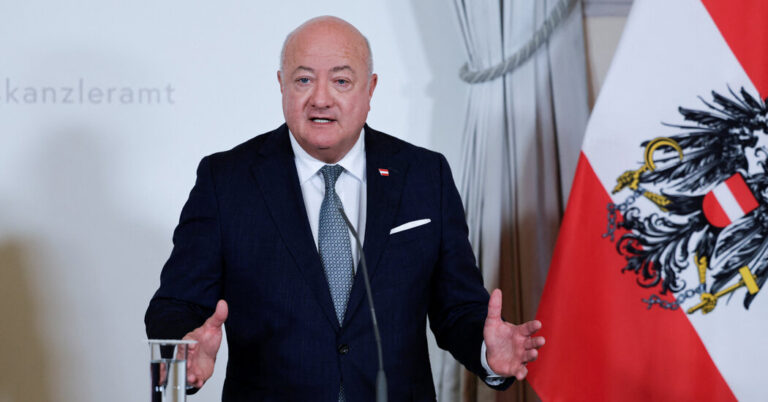Austria’s government will make good on pledges to double its military budget over the next seven years, its chancellor has affirmed, in the latest example of a newly unsettled global outlook driving a boom in defense spending in Europe.
The chancellor, Christian Stocker, who took office in March and is a member of the center-right Austrian People’s Party, told The New York Times in an interview in Vienna on Monday that the historically neutral Alpine nation must respond to growing threats and uncertainties. That means reversing a decades-long trend of shrinking military budgets as a share of the economy.
“After the fall of the Iron Curtain, after a peace effort that evolved from the 1970s under Jimmy Carter, disarmament was a dream that was dreamed but is now over,” Mr. Stocker said.
His comments are the latest response from European leaders to a rapidly changing security situation on the continent, which has wiped out the so-called peace dividend many countries enjoyed after the Cold War.
Countries across Europe have pledged to ramp up military spending in the face of Russia’s three-year invasion of Ukraine and fears that the United States will pull back some or all of the troops, weapons and other support that have for decades helped guarantee European security.
Austria’s neighbor Germany has pledged to spend 5 percent of its annual economic output on military and strategic infrastructure, an increase financed in part by additional borrowing. Its fellow NATO members committed to the same target last month, under prodding from President Trump.
Austria is not a member of NATO. Its standing army is small. And it is in the thick of a budget crisis, which Mr. Stocker and his coalition government are beginning to tackle by reducing government spending and raising some taxes.
Yet the new governing coalition plans to raise military spending gradually from below 1 percent of gross domestic product last year to 2 percent by 2032.
Austria’s neutrality “obligates us to national defense, comprehensive national defense in particular,” Mr. Stocker said. “And given the developments we are seeing, we will do more here than we have done.”
Austria’s spending will still be well short of that of Sweden and Finland, which after years of neutrality joined NATO after Russia’s attack on Ukraine in 2022.
The fact that Mr. Stocker is willing to push for more spending on defense, even while his own government has committed to controlling its enormous debt, is a sign of how worried Europeans have grown about security.
The added money, around $5.8 billion, could buy air defense capabilities as part of the European Sky Shield Initiative, which coordinates such procurements. It could also buy heavy — and expensive — weapon systems, like helicopters and fighter jets, Mr. Stocker said.
Austria’s foreign minister, Beate Meinl-Reisinger, said in an interview on Tuesday that Russia’s invasion of Ukraine had worried Austrians — and that staying out of the fray would not ensure the nation’s security.
“With the threats we are right now facing and seeing, neutrality doesn’t protect you at all,” she said. “So we have to invest in our readiness for defending ourselves.”
The plan still faces skeptics inside the government and out. Many older voters, on whom Mr. Stocker relies, see military spending as anathema to Austria’s vaunted neutrality, said Peter Filzmaier, a political scientist who teaches in a pair of Austrian universities.
Defense issues are growing more important in Austria, he said, “in a new world order that is rapidly changing.”
But military spending is linked to a debate in Austria about the neutrality clause written into the Austrian Constitution when four World War II allies — Britain, France, the United States and the Soviet Union — gave up their joint occupation of Austria in 1955.
To change or modernize the neutrality clause would take a two-thirds majority in the 183-seat Austrian Parliament. The far-right Freedom Party, which has 57 seats but is not part of Mr. Stocker’s coalition, has deep ties to Russia and has long campaigned on more neutrality, not less.
Mr. Stocker sat for the interview in his wood-paneled, parquet-floored office in the Vienna chancellery, underneath a black-and-white photograph taken in 1955 when Austrians adopted their constitutional neutrality.
In the discussion, he referenced Russia’s moves in Ukraine, along with Mr. Trump’s plans to impose widespread tariffs on allies, as part of a long list of recent developments rattling global politics.
In keeping with Austria’s neutrality, Mr. Stocker suggested that his country would be open to hosting peace talks between Moscow and Kyiv, if they ever came to pass.
“The question of Ukraine is also a deeply European one,” he said. “This war is taking place on our continent, and therefore there is a willingness to negotiate.”


